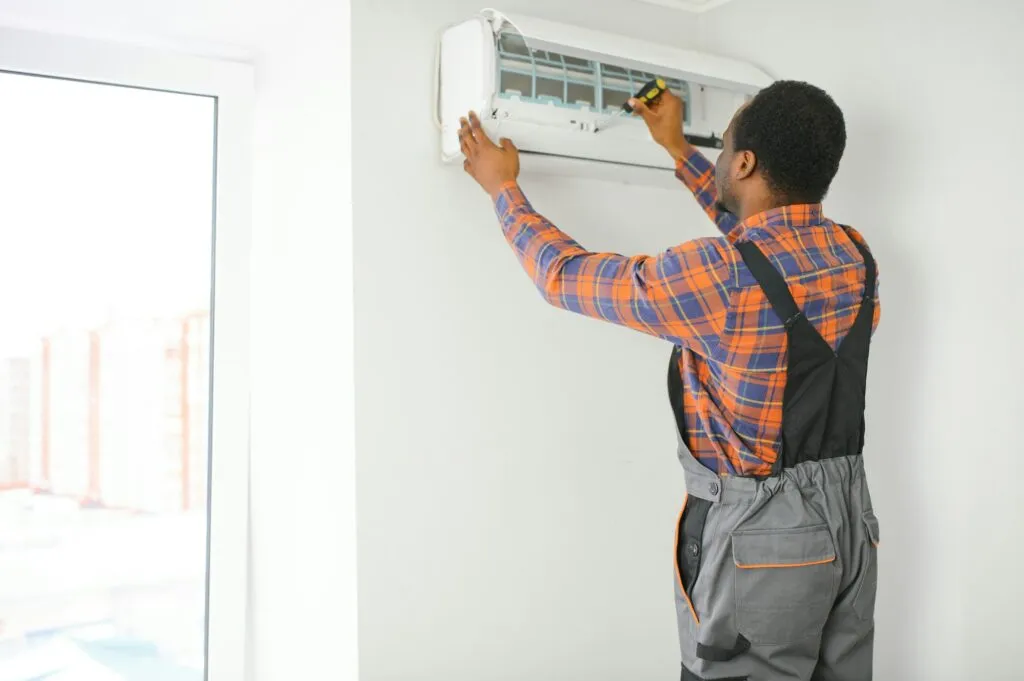- Understanding Air Conditioner Leaks
- Clogged Condensate Drain Line
- Dirty Air Filters
- Low Refrigerant Levels
- Damaged or Rusted Drain Pan
- Improper Installation
- Blocked Air Vents
- Conclusion
- FAQ — Air Conditioner Leaks
- What are the most common causes of air conditioner leaks?
- How do I know if my AC is leaking water vs. refrigerant?
- Why does a clogged condensate drain line cause leaks?
- Can a dirty air filter lead to leaks?
- What problems can a frozen evaporator coil create?
- How does improper installation or leveling cause leaks?
- What is a condensate pump and how can it fail?
- Could high indoor humidity make my system “leak”?
- How do cracked or rusted drain pans cause leaks?
- What is a float switch and can it prevent water damage?
- Are secondary (emergency) drain lines necessary?
- Can low refrigerant charge cause water leaks?
- What DIY steps can I try to stop minor water leaks?
- When should I call a professional for AC leaks?
- How can I prevent future air conditioner leaks?
- What maintenance checklist should I follow each season?
Air conditioner leaks can be a frustrating issue for homeowners and property developers alike. Whether you’re facing water pooling around your unit or experiencing water dripping indoors, understanding the common causes can help you address the problem effectively. In this article, we will explore why air conditioners leak and provide solutions to fix these issues efficiently. By identifying and addressing these problems early, you can prevent more serious damage and ensure your cooling system remains efficient and reliable.

Understanding Air Conditioner Leaks
Air conditioners work by drawing warm air from inside your home, cooling it down, and then circulating it back into your living space. This process involves a series of intricate operations, where warm indoor air is pulled in, passed over cold evaporator coils, and then returned as cooled air. During this process, condensation naturally forms as the warm air passes over the cold evaporator coils. This condensation is typically drained away safely, but when something goes wrong, it can lead to leaks. Understanding how and why this water is produced can help in diagnosing and addressing leak issues.
Why Is My Air Conditioner Leaking Water?
There are several potential reasons for an air conditioner to leak water. Identifying the root cause is essential for effective repair. While some issues might be easily identifiable and fixable by homeowners, others might require professional intervention. Let’s explore some common causes:
Clogged Condensate Drain Line
The condensate drain line is responsible for carrying away the moisture collected from your home’s air. Over time, this line can become clogged with dirt, dust, or mold, leading to water backup and leaks. This is a frequent problem, especially in areas with high humidity, where mold and algae growth can quickly clog the line.
How to Fix It
To address this issue, locate the drain line and use a wet/dry vacuum to remove any blockages. This method can effectively clear minor clogs and restore normal drainage. For more stubborn blockages, you might consider using a plumber’s snake or a specialized cleaning solution. Regular maintenance and cleaning of the drain line can prevent future clogs, ensuring that water is properly channeled away from your air conditioning unit and reducing the risk of leaks.
Dirty Air Filters
Air filters play a vital role in maintaining the airflow through your system. When these filters become dirty or clogged, they restrict airflow, causing the evaporator coils to freeze. Once the ice melts, it results in excess water that can lead to leaks. This not only causes water damage but also forces your system to work harder, reducing its efficiency and lifespan.
Solution
Ensure you regularly check and replace air filters every 1-3 months, depending on usage. This simple maintenance task can prevent leaks and improve your system’s efficiency. In addition to preventing leaks, clean filters promote better indoor air quality and reduce energy consumption. Investing in high-quality filters can also trap more particles, offering added protection to your system and home environment.
Low Refrigerant Levels
Refrigerant is essential for the cooling process in your air conditioner. When the refrigerant levels are low, it can cause the pressure in the system to drop, leading to coil freezing. As with dirty filters, melting ice results in excess water. Low refrigerant levels can also indicate a leak in the system, which requires immediate attention to prevent further damage and inefficiency.
Addressing Low Refrigerant Levels
If you suspect low refrigerant levels, it’s best to contact a professional HVAC technician to inspect and recharge your system. They can also check for leaks in the refrigerant lines. Regular inspections by a qualified technician can help detect issues early, ensuring that your system remains charged and operates efficiently. Attempting to handle refrigerants without proper training and equipment can be dangerous and is not recommended.
Damaged or Rusted Drain Pan
The drain pan collects condensation from the evaporator coils. Over time, it can rust or become damaged, leading to water leaks. This is particularly common in older units where wear and tear are more prevalent. A compromised drain pan can significantly impact the drainage process, allowing water to overflow and cause damage to surrounding areas.
What You Can Do
Inspect the drain pan for any signs of rust or damage. If necessary, replace it to ensure proper water drainage. A professional technician can assist with this replacement, ensuring that the new pan is installed correctly and effectively. Regular inspections can help catch early signs of wear, allowing for timely replacements before significant leaks occur.
Improper Installation
An improperly installed air conditioner can lead to various issues, including water leaks. This often occurs when the unit is not level, causing water to overflow from the pan instead of draining properly. Installation errors can also lead to inefficient operation, increased energy costs, and premature system failure.
Correcting Installation Issues
Ensure that your air conditioner is installed on a level surface and secured correctly. If you suspect installation issues, consult with a professional to rectify the situation. They can assess the setup and make necessary adjustments to ensure optimal performance and leak prevention. A properly installed unit not only operates more efficiently but also reduces the likelihood of future problems.
Blocked Air Vents
Blocked or closed air vents can disrupt the airflow in your system, leading to coil freezing and subsequent leaks. This disruption can cause uneven cooling, placing additional strain on your air conditioner as it tries to compensate for the lack of airflow.
Keeping Air Vents Clear
Regularly check that all air vents are open and unobstructed to maintain proper airflow and prevent leaks. This simple step ensures that air circulates freely, reducing the risk of coil freezing and system overworking. Additionally, keeping vents clear can improve overall comfort by ensuring even distribution of cooled air throughout your living space.
Conclusion
Air conditioner leaks are a common issue that can be resolved with proper maintenance and timely interventions. By understanding the common causes of leaks and taking preventive measures, you can ensure your air conditioning system operates efficiently and effectively, providing comfort without the hassle of water damage. Regular maintenance not only prevents leaks but also enhances the performance and longevity of your unit, saving you from costly repairs and replacements in the long run.
For persistent issues or complex repairs, it’s always best to contact a trusted HVAC professional who can provide expert advice and service. Remember, regular maintenance is key to preventing leaks and extending the lifespan of your air conditioning system. By investing in routine check-ups and addressing problems early, you can enjoy a leak-free and efficient air conditioning experience, keeping your home comfortable and your mind at ease.
FAQ — Air Conditioner Leaks
What are the most common causes of air conditioner leaks?
Typical culprits include a clogged condensate drain line, a cracked or rusted drain pan, a failed condensate pump, a frozen evaporator coil that thaws, improper unit leveling, or high indoor humidity causing duct “sweating.”
How do I know if my AC is leaking water vs. refrigerant?
Water leaks leave puddles near the indoor unit or ceiling stains below an attic air handler. Refrigerant leaks don’t puddle; they cause poor cooling, hissing, oily residue on lines, and icing on the coil or suction line.
Why does a clogged condensate drain line cause leaks?
Algae, dust, and debris can block the drain, backing water into the pan until it overflows. Clearing the blockage and flushing the line restores proper drainage.
Can a dirty air filter lead to leaks?
Yes. A clogged filter restricts airflow, dropping coil temperature below freezing. When the ice melts, excess water can overflow the pan or overwhelm the drain.
What problems can a frozen evaporator coil create?
Ice formation indicates airflow or refrigerant issues. As the coil thaws, large volumes of water can spill over, causing ceiling stains or equipment damage.
How does improper installation or leveling cause leaks?
If the air handler or drain pan isn’t pitched toward the drain, condensate can pool and spill. Correct slope ensures water flows freely into the drain line.
What is a condensate pump and how can it fail?
Where gravity drainage isn’t possible, a pump moves condensate to a drain. If the pump fails or its reservoir switch sticks, water can overflow and leak.
Could high indoor humidity make my system “leak”?
Excess humidity can condense on cold supply ducts or registers (“sweating”) and drip. Improving insulation, sealing ducts, and controlling humidity reduces this issue.
How do cracked or rusted drain pans cause leaks?
Over time, metal pans corrode and plastic pans can crack, letting condensate escape. Replacing damaged pans prevents recurring leaks.
What is a float switch and can it prevent water damage?
A float or wet-switch shuts the system off when water rises in the pan, preventing overflow. If your AC won’t run and water is present, the safety device may have tripped.
Are secondary (emergency) drain lines necessary?
Yes, especially for attic units. An auxiliary pan with a secondary drain helps catch overflows and route water safely outdoors, reducing ceiling damage risk.
Can low refrigerant charge cause water leaks?
Indirectly. Low charge can lead to coil icing due to reduced pressure/temperature. When the ice melts, the surge of water can overflow the pan.
What DIY steps can I try to stop minor water leaks?
Start with:
- Turn cooling off and let any ice fully melt
- Replace a dirty air filter
- Clear the drain line with a wet/dry vacuum at the exterior outlet
- Pour a small amount of vinegar into the drain access to inhibit algae
- Verify the air handler is level and the pan drains freely
When should I call a professional for AC leaks?
Call if leaks return after basic steps, you see persistent icing, the float switch keeps tripping, the condensate pump fails, the drain pan is damaged, or you suspect a refrigerant leak.
How can I prevent future air conditioner leaks?
Preventive tips include routine filter changes, annual professional tune-ups, coil cleaning, drain line flushing, ensuring proper unit pitch, insulating cold ducts, and verifying secondary drain protection.
What maintenance checklist should I follow each season?
Use this quick list:
- Install a fresh air filter at season start and check monthly
- Flush the condensate drain and test the float switch
- Inspect and clean indoor/outdoor coils
- Confirm the air handler is level and the pan is intact
- Insulate sweating ducts and seal obvious air leaks

